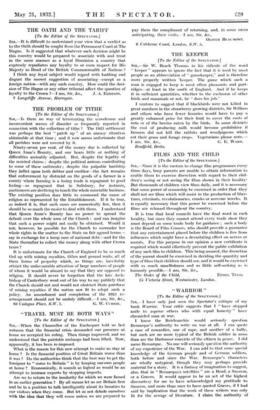THE PROBLEM OF TITHE
[To the Editor of the SPECTATOR.]
Sin,—Is there no way of terminating the unwelcome and inconvenient scenes of disorder so frequently reported in connexion with the collection of tithe ? The 1995 settlement was perhaps the best patch up " of an uneasy situation obtainable at that time ; and it now seems unfortunate that all parishes were not covered by it.
Ninety-seven per cent. of the money due is collected by Queen Anne's Bounty, and one hears little or nothing of difficulties amicably adjusted. But, despite the legality of the resisted claims ; despite the political animus contributing to some of these outbreaks ; despite the palpable hardship they inflict upon both debtor and creditor—the fact remains that enforcement by distraint on the goods of a farmer in a county where farming is a losing trade is repugnant to good feeling—so repugnant that in Salisbury, for instance, auctioneers are declining to touch the whole miserable business. The existing position does little to commend the cause of religion as represented by the Establishment. If it be true, as indeed it is, that such cases are numerically few, then it should be so much the easier to deal with them. I understand that Queen Anne's Bounty has no power to spread the default over the whole area of the Church : and can imagine that such a power might not easily be obtained. Would it not, however, be possible for the Church to surrender her whole rights in the matter to the State on fair agreed terms— say in exchange for a lump sum of national debt—and for the State thereafter to collect the money along with other Crown taxes ?
It is unfortunate for the Church of England to be so much tied up with mining royalties, tithes and ground rents, all of them forms of property which, as things are, inevitably attract the unfavourable attention of large numbers of people of whom it would be absurd to say that they are opposed to religion. It should never be forgotten that the late Arch- bishop of Canterbury went out of his way to say publicly that the Church should not and would not obstruct State purchase of mining royalties if the nation saw fit to adopt such a policy. An amendment and completion of the 1923 re- arrangement should not be unduly difficult.—I am, Sir, &c.,




































 Previous page
Previous page